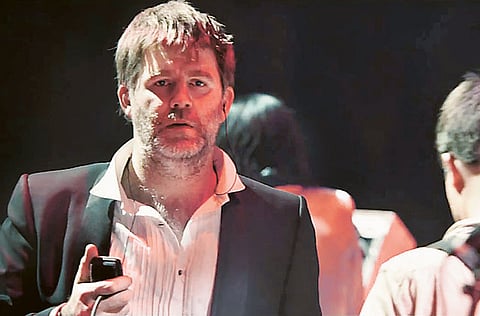Hits ring a bell in James Murphy documentary
James Murphy's Documentry shut up and play the hits, bears witness to the break-up of his band-LCD soundsystem.

Rock stars tend to exit the public stage in one of two ways: with a burst of drama or by fading away on sad-sack tours. James Murphy, the elusive frontman of the indie-rock band LCD Soundsystem, tried a third way: retiring on top.
In February 2011, with the band's internal dynamics smooth and commercial fortune smiling upon it, Murphy, for seemingly no good reason, announced that he was breaking up the group. He made one last media appearance (on Comedy Central's The Colbert Report), played a final show at Madison Square Garden and called it a day.
Murphy's Barry Sanders-like move is explored — enigmatically, of course — in Shut Up and Play the Hits, a documentary that premiered at the Sundance Film Festival about the one-time DJ and his final days as head of the soul/punk/disco-tinged rock band he created in 2002.
Murphy is in nearly every frame of the movie, yet his essence remains tantalisingly out of sight.
He's remarkably ordinary, yet with his economy of words and unusual choices, a sense of mystery always seems to hover over him.
"If you succeed, people assume you're not like them. I did the same thing with rock stars," Murphy said by phone from New York before flying to Sundance.
"But I'd be totally lunatic to think it's something essential about myself that has any kind of mystique."
His fans seem to feel otherwise. Over the course of three LCD studio albums and numerous smaller and underground releases, the group's music became a kind of gospel for a generation of cool-chasing kids, as Murphy won over legions with his quaint, throwback, noncorporate sensibility.
Cross-cutting between the now-famous Garden show and the morning after as Murphy prosaically walks his dog and cleans out a storage room, Hits is both about LCD Soundsystem and something larger.
The directors, the British documentarians Dylan Southern and Will Lovelace (who directed the Blur documentary No Distance Left to Run), pitch their film somewhere between concert movie and intimate portrait.
They're not afraid to stay with the music: Unlike many concert documentaries, they use a cinematographer to shoot the band onstage and allow entire LCD songs such as Losing My Edge and All My Friends to play uncut. Murphy even helped mix the movie's sound.
But the filmmakers also slyly use Murphy to engage the audience in questions about the nature of fame: what we want from rock stars and how they feel about giving it to us. Reserved, chubby and sporting grey stubble for much of the film, the 41-year-old musician is in many ways the anti-rock star. And that somehow makes him even more compelling.
Hard to resist
"When you meet James, there's an aspect of personality, a contrarian-ness in how he approaches stuff, that's hard to resist," Southern said.
Audiences get a glimpse of that contrarian-ness via an interview Murphy did with music journalist Chuck Klosterman, portions of which the filmmakers sprinkle throughout the film.
But the directors tell their story without using any talking heads, following a tactic tried by last year's break-out Sundance documentary, Senna, and in fact include little background on the band in general, focusing instead on just its final few days.
"We never had any intention of making a biography; we didn't want it to be the film of the band met here and then this happened. We wanted to capture what was happening during a moment in time," Southern said.
The essential question of that moment — why did Murphy do it?— is both hinted at and kept at a remove. The musician is shown saying he was concerned for his health if he kept going with the band and its heavy touring demands. He also says he didn't want the responsibilities of fame that he thought awaited if the band continued and that he hoped to slow down and have a family.
But one can't help getting the sense that the real reason is that there is no reason, that he stopped the band for the same reason he started it: because he could.
Nine months removed from the end of the band, things haven't quieted for Murphy. He said he has no plans of getting the band back together but is continuing to write music and DJ.
"I'll probably make a stupid solo record and think, like everyone who does that, that it will do better than the other records. And probably nobody will care about it," he said.
As for his feelings now about his decision, Murphy said it would be foolish to think he doesn't contemplate what could have been. He has no intention of getting LCD Soundsystem back together, but that doesn't mean he can easily quiet the voices in his head.
"It's not an argument that stops," he said. "It kind of just keeps going."
Sign up for the Daily Briefing
Get the latest news and updates straight to your inbox

